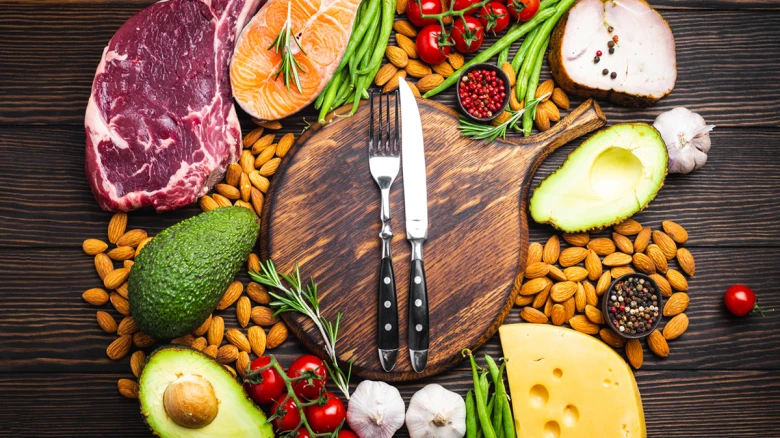Regional

Most Indians consume far less than this amount, rarely exceeding 50 gm per day. This influences our muscle mass. According to studies, Indians of all ages have low muscle mass ("sarcopenia") when compared to populations with higher protein intakes.
color:black;mso-themecolor:text1">
color:black;mso-themecolor:text1">Digital Desk: Do proteins play a role in
diabetes diets? When we talk about diabetes and meal planning, we tend to focus
on carbohydrates (carbs). Diabetes is also known colloquially as sugar. The
link between sugar and diabetes is strong and deeply ingrained in our minds.
Not only diabetics, but every health-conscious person, talks about cutting
carbs from their diet. In all of this craziness, we frequently overlook the
importance of proteins.
color:black;mso-themecolor:text1">
color:black;mso-themecolor:text1">Our diet contains three "macro"
nutrients: carbohydrates, protein, and fats. Proteins are the building blocks
of our bodies and are essential for growth, muscle development, and bone
formation. They are also important components of hormones and many enzymes at
the cellular level, as well as in the development of immunity. Muscles contain
approximately half of the proteins in our bodies. Proteins are also broken down
into glucose by the body and used for energy in a process known as
gluconeogenesis.
color:black;mso-themecolor:text1">
color:black;mso-themecolor:text1">India is a carbohydrate-loving country. In
general, our protein intake is inadequate. The Indian Council of Medical
Research (ICMR) recommends 0.8 to 1 gm of protein per kg body weight per day
for adults. This means that a 70 kg average Indian should consume 56-70 gm
protein per day. Most Indians consume far less than this amount, rarely exceeding
50 gm per day. This influences our muscle mass. According to studies, Indians
of all ages have low muscle mass ("sarcopenia") when compared to
populations with higher protein intakes.
color:black;mso-themecolor:text1">
color:black;mso-themecolor:text1">Protein consumption is plagued by myths such
as "patients with diabetes should not consume much protein,"
"protein-rich diets may harm your kidney," "protein is difficult
to digest," "protein leads to weight gain," and "protein is
only for body builders." Some of these myths originate in the Western
world, where protein intake is much higher than in India. Excess protein intake
is a concern in some of these countries, whereas meeting normal protein
requirements is difficult for Indians.
text1">
How does protein
intake impact diabetes?
color:black;mso-themecolor:text1">
color:black;mso-themecolor:text1">1. When you eat carbohydrates with protein (or
fat), your body may take longer to convert the carbs into glucose, resulting in
lower post-meal blood sugar levels in Type 2 diabetes patients.
mso-fareast-font-family:Arial;color:black;mso-themecolor:text1">2.
color:black;mso-themecolor:text1">Although one gram of protein contains four
calories, the same as carbohydrates, it reduces calorie intake by providing
satiety, which also aids in blood sugar control.
mso-fareast-font-family:Arial;color:black;mso-themecolor:text1">3.
color:black;mso-themecolor:text1"> A low
protein diet causes muscle loss, which increases the risk of falls and
fractures in diabetics over 65. Individuals with long-standing diabetes may be
more prone to falling due to nerve, muscle, and eye involvement.
color:black;mso-themecolor:text1">
4. A
lack of muscle mass contributes to insulin resistance. So, it's not just
adipose tissue that contributes to insulin resistance and its long list of
consequences; it's also a lack of muscle mass.
text1"> 5. New research suggests that
low muscle mass – and, by extension, low protein intake – promote the development of fatty
liver disease, which can lead to liver cirrhosis and even cancer.
text1">
If we have diabetes, how should
we approach the protein issue?
mso-themecolor:text1;border:none windowtext 1.0pt;mso-border-alt:none windowtext 0in;
padding:0in;font-weight:normal;mso-bidi-font-weight:bold">On a daily basis, we
should aim to get 15-20% of our calories from proteins, with a bare minimum of
0.8 gm/kg body weight protein. For people with diabetes, this should ideally be
greater than 1 gm/kg, unless they have kidney involvement. Even for those with
kidney problems, an intake of 0.8 gm- 1 gm/kg is advised!
mso-themecolor:text1;border:none windowtext 1.0pt;mso-border-alt:none windowtext 0in;
padding:0in;font-weight:normal;mso-bidi-font-weight:bold">
text1">Our requirement also depends on our exercise level, so a higher intake
1-1.5 g/kg is recommended for some. Athletes often have to consume much higher
amounts.
color:black;mso-themecolor:text1">Try to get protein in every meal for maximum
benefit. Having one high protein meal with other meals being devoid of proteins
is not the best health management method.
Proteins are not all the
same. Their quality is also important. Animal proteins are generally superior
to plant proteins, though there has been a lot of effort in recent years to
improve the latter. Amino acids are the building blocks of protein. Some of
these cannot be produced by the human body and must be obtained through diet.
These are referred to as essential amino acids.
text1">Dairy products such as milk, curd, and paneer, as well as eggs, meat,
fish, and poultry, are the best sources of protein because they contain all of
the essential amino acids.
Lentils, beans, and nuts
are examples of protein-rich vegetables. The soya bean is an excellent source.
Consume dairy and dals if you are a vegetarian. Add soya bean if you like the
taste. Please have a nutritionist calculate your protein intake if you are
vegan to ensure you do not fall short! The majority of the amino acids are
provided by a combination of cereals, millets, and pulses, which complement
each other to provide higher quality proteins.
text1">A variety of proteins is always beneficial. One good rule to follow is
to look for protein in your plate at every meal. Make sure to include protein
in all of your major meals.
text1">
To give you some idea
about what common foods to consume, have a look at this list:
color:black;mso-themecolor:text1">100 gm of chicken = 30 gm
100 gm of fish = 22 gm
100 gm of cooked green soyabeans =12 gm
1 large egg = 6-7 gm
1 cup of milk (200ml) = 7 gm
1 katori of dal or beans = 5-6 gm
1 katori of dahi = 4 gm
Leave A Comment